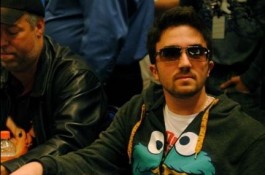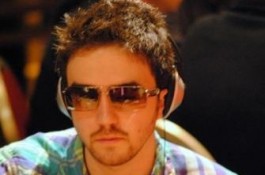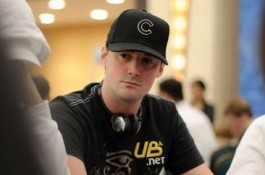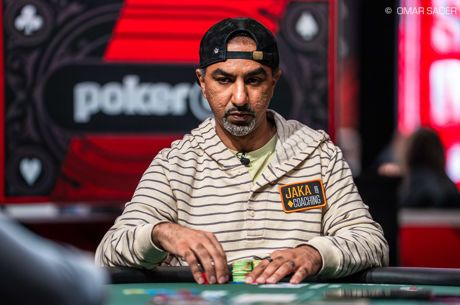Bluff Attempt at EPT Grand Final With Lex Veldhuis
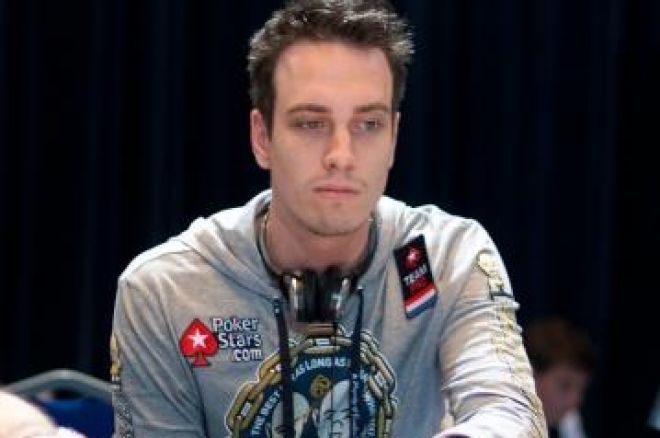
Lex Veldhuis has quite a reputation at the poker table, especially after an episode of the 2009 World Series of Poker Main Event aired with Veldhuis pulling off ballsy bluff after ballsy bluff. On Day 1B of the 2010 European Poker Tour Grand Final, his image came into play on a bluff attempt.
Veldhuis talks about the hand and touches on a few concepts: turning your hand into a bluff and table image.
Blinds: 100-200
Hand: Veldhuis raises to 525 from the cutoff with A?9?. The villain calls from the button, and the big blind calls as well.
I knew he was an internet player and he seemed really solid. He hadn��t played that many hands. I kind of perceived him as straight forward and tight-aggressive.
What do you think of his range when he flats your raise on the button?
I thought he had some connected cards or low pairs. I didn��t really put him on any strong hands. Especially with the way I play, he would probably get some value with a reraise.
Hand: The flop comes Jx10x9x. The big blind checks, and Veldhuis bets 1,100. The villain called and the big blind folded.
I wouldn��t normally always continuation bet it, but since the button and big blind called, I felt comfortable barreling. When I got called by the button, I was pretty much done with the hand. He could have queen-ten, queen-jack, king-jack, kind of combinations pretty often, and I didn��t think he was going to fold those.
Hand: The turn is a nine. The board now reads Jx10x9x9x. Veldhuis bet 2,800, and the villain called.
Now I��m going to go for value. After he called, I think he has like queen-jack, queen-ten, ace-jack, king-jack, jack-ten type stuff. I don��t think he has like ten-nine or jack-nine because I think he would raise that on the flop because it��s kind of a scary board, especially against a guy who��s going to barrel.
Hand: The river is an eight. The board now reads Jx10x9x9x8x. Veldhuis checks. The villain bets 6,000, and Veldhuis reraises all-in for 24,000. The villain tanked and then called with king-queen.
When I checked, I figured anything he was going to check behind with, I��m going to win against. He bet 6,000, and I pretty much put him on a straight here. Also, thinking that it��s a �10,000 tournament, I shoved 24,000 total. My reasoning for that was that it��s a spot that you hardly ever see people bluffing. I turned my nine into a bluff. If I didn��t have my nine as a blocker, I wouldn��t do it, but there are so many illogical combinations that he could have to have a full house that could call me. I put him on a straight and tried to push him off it. I like my play, but I don��t think it��s good if I do it. I think it��s a good bluff line against my opponent, but not by me. I do think he folds queen-jack, even though king-queen and queen-jack are kind of the same, he��d be chopping if I shoved with king-queen. I��m never shoving with just a naked queen. So he either chops against king-queen or loses to a boat. I don��t think a big percentage of the time I��m bluffing, but I guess it��s my image. I have to take that more into consideration.
Did he or the table get to see your cards?
No, I said, ��You��re good,�� and didn��t have to show which is a big advantage because otherwise they would know that I could turn hands into bluffs. After that hand I pretty much went into lockdown because no one was going to give me credit. If I would have won that hand, I would have had sick momentum, but I just had to adjust.
How much do you the think the ESPN episode affects your image?
Well, in online tournaments, I��m a pretty big nit. In cash games, I play pretty tight-aggressive with spew tendencies, I guess. So, I think the stuff on TV helped. Well, or didn��t help [laugh]. I think that after playing at the table for awhile, they are going to perceive me as aggressive anyway, so I don��t need the ESPN episodes for that. I guess I just have to keep adjusting, and I should have just folded the river.
What advice would you give to players who have trouble changing an image they��ve developed?
I think if you have a developed image, the problem is not so much what you should do to change it. It��s more so how to use it. If people start saying, ��Oh you three-bet. You have aces,�� some people get offended, but you should just think, ��I can start doing that with jack-ten or any two cards if people think that.�� If people keep saying, ��Lex never has anything,�� then I know not to bluff that person. You can always adjust to your advantage. I don��t think it��s a problem to have a developed image; you just have to deal with it.
Can you explain exactly what it means to turn a hand into a bluff and why it can be a good play?
Turning a hand into a bluff is when you have a hand that could very well be good at showdown, but you play it in a way that you can fold out slightly better hands. That��s important because people trick themselves into thinking they have showdown value. If you have a hand like nine-eight on a queen-jack-X-X-eight board and someone calls you twice, there��s a good chance they have a jack or a queen. You might think you have showdown value, but they might have a slightly better pair that you can get them to fold by turning your hand into a bluff.
Follow us on Twitter for up-to-the-minute news.

